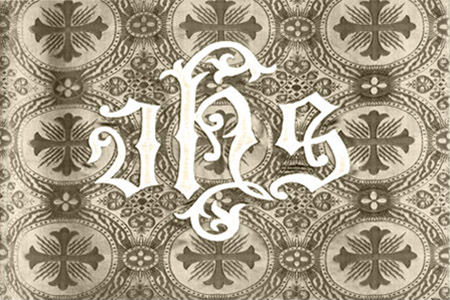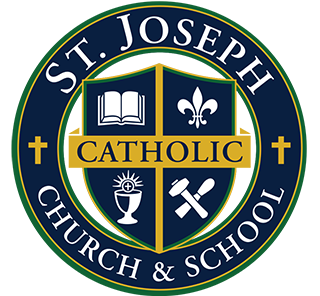About Our Faith
Our Catholic faith comprises what we believe and how we live that belief. For 2,000 years, this Catholic faith has been handed down from one generation to next, starting with Jesus Christ passing the faith to the Twelve Apostles. In our own lives, we may receive that faith from our parents, from friends, or even a stranger we meet.
Living as a Catholic includes many wonderful beliefs, practices, and devotions; too many to catalog here. But we hope to provide you with a brief overview of what we believe and how we live that belief.
We hope this resource will be valuable to both interested non-Catholics as well as to those already Catholic who might be looking to deepen the practice of their faith.
 Prayer is communion with God. Prayer can be public or personal, spoken or silent. The psalms are prayers we sing; they have been a part of the Church’s communal prayer since the earliest days of the Church. Prayer is communication with a God who loves us and desires to be in relationship with us.
Prayer is communion with God. Prayer can be public or personal, spoken or silent. The psalms are prayers we sing; they have been a part of the Church’s communal prayer since the earliest days of the Church. Prayer is communication with a God who loves us and desires to be in relationship with us.
Jesus teaches us about the importance of prayer. The Gospels record seventeen times that Jesus took time apart to pray. In the Scriptures, Jesus prays often, morning and night. He prays during critical events in his life and he prays before ministering to people in need. Jesus is a model of prayer for us.
Prayer is essential to living a full, Catholic life. The central communal form of prayer for the Church is the Mass. Some of the Church’s most traditional and foundational prayers are as follows:
Grace before Meals
Bless us, O Lord, and these your gifts which we are about to receive from your goodness, through Christ our Lord. Amen.
Glory to the Father
Glory to the Father, and to the Son, and to the Holy Spirit: as it was in the beginning, is now, and will be forever. Amen.
The Lord’s Prayer
Our Father, who art in heaven, hallowed be thy name; thy kingdom come, thy will be done on earth as it is in Heaven. Give us this day our daily bread, and forgive us our trespasses, as we forgive those who trespass against us; and lead us not into temptation, but deliver us from evil. Amen.
Hail Mary
Hail, Mary, full of grace. The Lord is with you. Blessed are you among women; and blessed is the fruit of your womb, Jesus.
Holy Mary, Mother of God, pray for us sinners, now and at the hour of our death. Amen.
Act of Contrition
My God, I am sorry for my sins with all my heart. In choosing to do wrong and failing to do good, I have sinned against you whom I should love above all things. I firmly intend, with your help, to do penance, to sin no more, and to avoid whatever leads me to sin. Our Savior Jesus Christ suffered and died for us. In his name, my God, have mercy.
Hail, Holy Queen
Hail, holy Queen, Mother of mercy, hail, our life, our sweetness, and our hope. To you we cry, the children of Eve; to you we send up our sighs, mourning and weeping in this land of exile. Turn, then, most gracious advocate, your eyes of mercy toward us; lead us home at last and show us the blessed fruit of your womb, Jesus: O clement, O loving, O sweet Virgin Mary.
There are also contemporary ways to pray. Talking with God each day, no matter the form or words used nourishes our relationship and helps it to grow.
- Silent prayer or meditation helps us center our thoughts on God’s goodness and offers renewal in a noisy, hectic world.
- Lectio Divina is a way of praying with the sacred Scriptures. Find a Scripture passage that speaks to you. Read it out loud and then reflect upon it silently for several minutes. Read it again. Notice any words or phrases that stick with you. Ask God what you are to learn from this passage. Listen.
- Keep a prayer journal with all of your wants, needs, thoughts, and reflections related to your prayer life.
The seasons of the Church follow one universal liturgical calendar. The order of the year is as follows:
Advent
Advent marks the beginning of the liturgical calendar. It consists of the four Sundays leading up to Christmas.
Christmas
In the Catholic Church, Christmas is more than one day – it is a season that begins on Christmas Eve (Dec. 24), continues through the Feast of the Epiphany and includes the Solemnity of Mary, the Mother of God. Christmastide concludes with the Feast of the Baptism of the Lord in January.
Lent
The forty days of Lent is reminiscent of Jesus’ forty days in the desert. Lent is a season of repentance and renewal in solidarity with those preparing for the Sacraments of Initiation to be received at Easter. Lent begins on Ash Wednesday and continues until the Mass of the Lord’s Supper on Holy Thursday.
Triduum (or Holy Week)
The Triduum is the most important three days in the liturgical year. Holy Thursday (which commemorates the Last Supper), Good Friday (which commemorates Jesus’ crucifixion and death on the cross), and Holy Saturday (where the Church pauses to commemorate the Lord’s burial). The Easter Vigil is celebrated on Holy Saturday night when new members of the faith receive the Sacraments of Initiation and are welcomed into the Church.
Easter
Alleluia – He is Risen! The Easter season celebrates Christ’s resurrection from the dead, his victory over death. Christ’s Ascension into heaven is celebrated on the 7th Sunday after Easter. Eastertide concludes at Pentecost, where Jesus sends the Holy Spirit upon the apostles to spread the Gospel to all nations.
Ordinary Time
The season of Ordinary Time explores Christ’s mission and message through the Gospels. This season includes Trinity Sunday (which celebrates God’s self-revelation as a Trinity of Persons) and Corpus Christi (which celebrates the Body and Blood of Jesus in the Eucharist). Ordinary Time concludes with the Solemnity of Christ the King which brings the liturgical year to a close.
During the year, in addition to the Sunday worship, the Church also celebrates Solemnities, Feasts, and Memorials which may be on any day of the week. These occur during the year to commemorate special events or persons that are highly revered by the Catholic Church.

 The Pope
The Pope
As Vicar of Jesus Christ, the Pope governs the Catholic Church as its supreme head. The Pope, as Bishop of Rome, is the chief pastor and shepherd of the whole Church. We believe that the Pope is the successor of Peter, and his bishops are successors of the Twelve Apostles.
It is clear throughout that it is a question of the bishops acting in conjunction with their head, never of the bishops acting independently of the Pope. In the latter instance, without the action of the head, the bishops are not able to act as a College: this is clear from the concept of “College.” This hierarchical communion of all the bishops with the Supreme Pontiff is certainly firmly established in Tradition. (Lumen Gentium, Note of Explanation)
In the Acts of the Apostles, we come to know Peter is the head of the early church. When Peter is given the “keys to the kingdom,” Christ is establishing the divine office of leadership over the church. The permanence of the office of the Pope is essential to the everlasting nature of the church.
“The Roman Pontiff, head of the college of bishops, enjoys this infallibility in virtue of his office, when, as supreme pastor and teacher of all the faithful – who confirms his brethren in the faith – he proclaims by a definitive act a doctrine pertaining to faith or morals…The infallibility promised to the Church is also present in the body of bishops when, together with Peter’s successor, they exercise the supreme Magisterium,” above all in an Ecumenical Council. When the Church through its supreme Magisterium proposes a doctrine “for belief as being divinely revealed,” and as the teaching of Christ, the definitions “must be adhered to with the obedience of faith.” This infallibility extends as far as the deposit of divine Revelation itself. (CCC 891)
Divine assistance is also given to the successors of the apostles, teaching in communion with the successor of Peter, and, in a particular way, to the bishop of Rome, pastor of the whole Church, when, without arriving at an infallible definition and without pronouncing in a “definitive manner,” they propose in the exercise of the ordinary Magisterium a teaching that leads to better understanding of Revelation in matters of faith and morals. To this ordinary teaching the faithful “are to adhere to it with religious assent” which, though distinct from the assent of faith, is nonetheless an extension of it. (CCC 892)
Christian Unity
Unity is essential for the followers of Jesus. John’s gospel reminds us, “The glory which You have given Me I have given to them, that they may be one, just as We are one; I in them and You in Me, that they may be perfected in unity, so that the world may know that You sent Me, and loved them, even as You have loved Me.” (John 17:22-23)
The Catholic Church is united under the leadership of the Bishop of Rome, the Pope. Historical breaks and schisms have left us fractured, with the Eastern Orthodox churches no longer in full unity with Roman Catholicism. Beginning with John XXIII and continuing through the papacy of John Paul II and our current pope, the movement to come together in full Christian unity has been underway.
Catholic Essentials
The 7 Corporal Works of Mercy
- To feed the hungry
- To give drink to the thirsty
- To clothe the naked
- To shelter the homeless
- To care for the sick
- To visit the imprisoned
- To bury the dead
The 7 Gifts of the Holy Spirit
- Wisdom
- Understanding
- Counsel/Right Judgment
- Fortitude/Courage
- Knowledge
- Piety/Reverence
- Fear of the Lord/Awe and Wonder
The 4 Cardinal Virtues
- Prudence
- Justice
- Fortitude
- Temperance
The 2 Greatest Commandments
When asked which was the greatest of the commandments, Jesus responded with two. In this teaching of Jesus, these commandments complement each other and cannot be seen as existing apart from the other. The first is to love the Lord thy God with all thy heart, soul, mind and strength and the second is to love your neighbor as yourself.
The 7 Spiritual Works of Mercy
- To share knowledge
- To give advice to those who need it
- To comfort the suffering
- To be patient with others
- To forgive those who hurt you
- To give correction to those who need it
- To pray for the living and the dead
Virtues
The 3 Theological Virtues
- Faith
- Hope
- Love (Charity)
The Ten Commandments
The Ten Commandments are more than simply rules and laws. They are a foundation of moral teaching and shape our obligations as Christians in relationship to God. The Ten Commandments were given to Moses by God on Mt. Sinai after being rescued by God from slavery in Egypt. These Commandments are the expression and sign of the Covenant between God and God’s people and are just as powerful and binding as they were when they were written.
- I am the Lord your God. You shall not have strange gods before me
- You shall not take the name of the Lord your God in vain
- Remember to keep holy the Lord’s day
- Honor your father and your mother
- You shall not kill
- You shall not commit adultery
- You shall not steal
- You shall not bear false witness against your neighbor
- You shall not desire your neighbor’s wife
- You shall not desire your neighbor’s goods
The 8 Beatitudes
These are teachings of Jesus during the Sermon on the Mount in which he describes the attitudes and actions that should characterize his disciples and followers. They can be seen as blueprints for living an authentic Christian life.
Blessed are the poor in spirit: for theirs is the Kingdom of Heaven
- Blessed are the meek: for they shall possess the land
- Blessed are they who mourn: for they shall be comforted
- Blessed are they that hunger and thirst after justice: for they shall have their fill
- Blessed are the merciful: for they shall obtain mercy
- Blessed are the clean of heart: for they shall see God
- Blessed are the peacemakers: for they shall be called children of God
- Blessed are they that suffer persecution for justice’ sake, for theirs is the Kingdom of Heaven
The 7 Last Words of Christ
- Father, forgive them, for they know not what they do. (Luke 23:34)
- Amen, I say to thee: This day thou shalt be with me in paradise. (Luke 23:43)
- Woman, behold thy son. . . .Behold thy mother. (John 19:26-27)
- Eli, Eli, (My God, My God, why hast Thou forsaken me?) (Matthew 27:46)lamma sabachtani?
- I thirst. (John 19:28)
- It is finished. (John 19:30)
- Father, into Thy hands I commend my spirit. (Luke 23:46)
Precepts of the Church
- Assist at Mass on Sundays and holy days of obligation, doing no unnecessary work on those days.
- Confess serious sins at least once a year.
- Receive Holy Communion frequently and, at a minimum, during the Easter Season.
- Fast and abstain on appointed days and times.
- Contribute to the support of the Church.
- Observe the laws of the Church concerning marriage and give religious training to one’s children by word, example, and use of parish schools or religious education programs.
- Join the missionary spirit and work of the Church.
The 14 Stations of the Cross
- Jesus is Condemned to Die
- Jesus is Made to Bear His Cross
- Jesus Falls the First Time
- Jesus Meets His Mother
- Simon Helps Jesus Carry His Cross
- Veronica Wipes Jesus’ Face
- Jesus Falls the Second Time
- Jesus Meets the Women of Jerusalem
- Jesus Falls the Third Time
- Jesus is Stripped
- Jesus is Nailed to the Cross
- Jesus Dies on the Cross
- Jesus is Taken Down from the Cross
- Jesus is Laid in the Tomb
Fruits of the Holy Spirit
- Charity
- Joy
- Peace
- Patience
- Goodness
- Kindness
- Long suffering
- Humility
- Faithfulness
- Modesty
- Continence
- Chastity
Four Marks of the Catholic Church
- One
- Holy
- Catholic
- Apostolic

